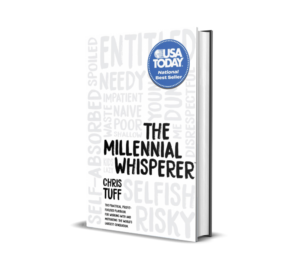By Rose O. Sherman, EdD, RN, NEA-BC, FAAN
 My conversations with nurse leaders are often about their challenges with the changes in the nursing workforce, and how they see it impacting the profession. More than 50% of nurses are either Millennials or Generation Z. Many of the trends that we see are here to stay. Successful leaders are those who can change their mindset about how they lead.
My conversations with nurse leaders are often about their challenges with the changes in the nursing workforce, and how they see it impacting the profession. More than 50% of nurses are either Millennials or Generation Z. Many of the trends that we see are here to stay. Successful leaders are those who can change their mindset about how they lead.
I recently read the book, The Millennial Whisperer, by Chris Tuff. He has become well-known nationally for his work with Millennials and has been branded as the Millennial Whisperer. He advises senior leaders who are striving to develop work environments where Millennials and Gen Zs can thrive. He hears comments from CEOs that finding a productive and reliable Millennial is synonymous with finding the elusive Lock Ness Monster. Many myths need to be dispelled, Tuff contends. But what is true that what these younger workers look for and need in leaders is different than previous generations.
My key takeaways about building a culture to attract and retain Millennials and Gen Z include the following:
1. Millennial and Gen Z staff want to feel inspired.
Making money is not enough. Today’s younger workforce wants to be in organizations where they can see a clear sense of purpose with leaders who inspire them. They need to know how they contribute to the overall goals of the organization. Tuff suggests that leaders need to provide clear values and a North Star, so everyone knows expectations. A sense of impact matters. Astute leaders continually connect their staff to the work of the organization in an explicit way. Millennials and Generation Z crave inclusion – they have grown up monitoring the number of likes that they get on social media. They need leaders who are positive, even during challenging situations. Psychological safety is crucial. Face to face interactions with leaders is essential. Coaching younger staff to find their purpose is a high-value activity. A sense of career progression is critical.
2. Millennial and Gen Z staff want a culture of transparency.
Millennials and Gen Z hate hypocrisy. Wise leaders share as much they can about organizational direction and finances. They also share information about what they do and how they are evaluated for their performance. This transparency fosters an authenticity that resonates with younger staff. When leaders withhold information or are not authentic – these generations won’t hesitate to call out the behavior.
3. Millennial and Gen Z staff want autonomy but need structure as well.
Younger staff want autonomy in their work but also need structure. They want clear goals but also need boundaries and deadlines. He recommends using the follow-up words “by when” for every activity that is assigned. Tuff acknowledges that the stress levels of this generation are high, and they are not always resilient. Grit needs to be demonstrated and discussed by leaders. In his own business, Tuff talks with younger staff about what he calls the 70/30 rule. 70% of any job, he advises, you will love, and it will give you energy, but there is also 30% of any job that you won’t enjoy doing but needs to get done. The grass is not greener in another role, but what fits into the 70 versus 30 percent could be different. He points out that many younger workers don’t know this. They assume they will enjoy every aspect of their work, and the environment will be perfect. He writes that as an outcome of extensive social media use, “they compare their insides to other people’s outsides” – so they assume they are the only ones with challenges.
There are some real pearls of wisdom here for nurse leaders who want to build cultures of retention. The key will be a willingness to change your mindset.
Read Rose Sherman’s new book available now – The Nurse Leader Coach: Become the Boss No One Wants to Leave
© emergingrnleader.com 2020


 LinkedIn
LinkedIn Instagram
Instagram